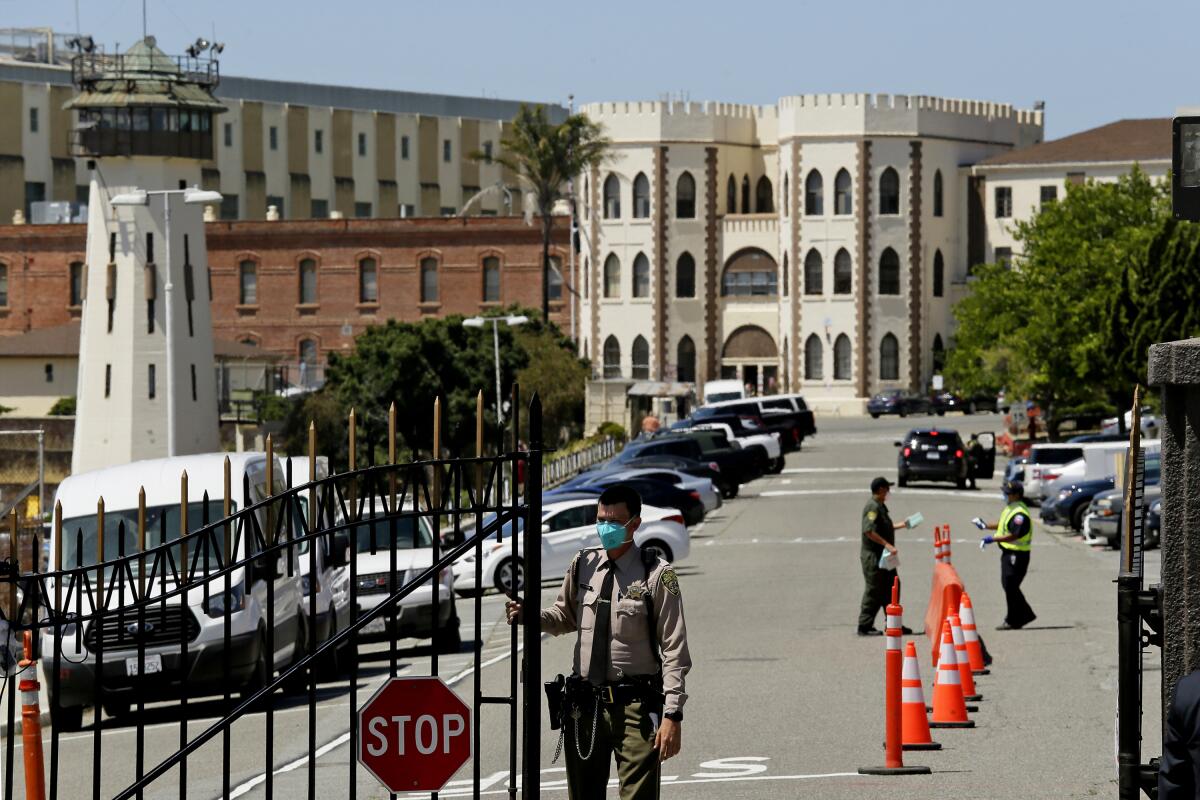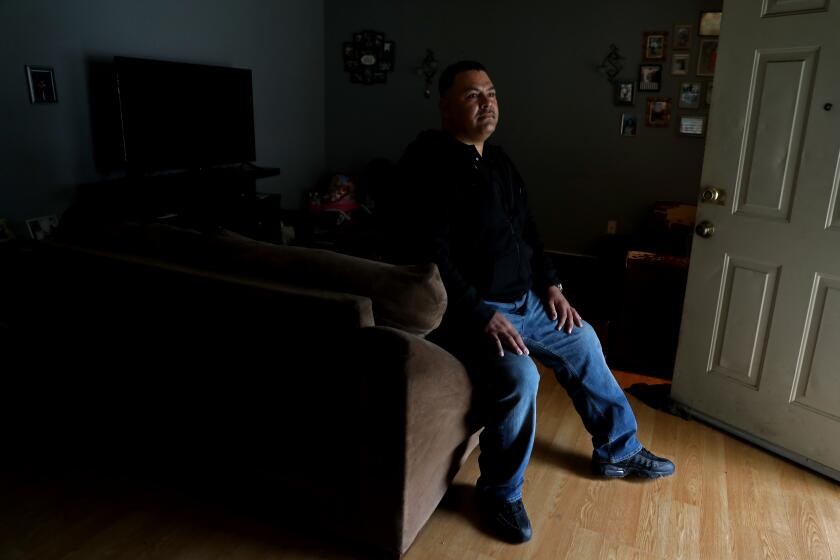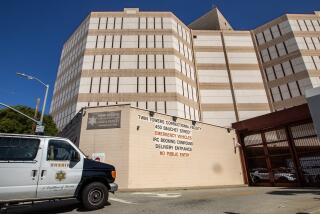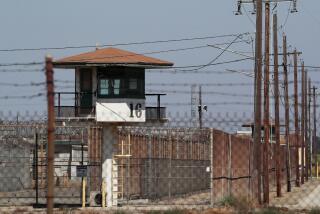Inmates’ attorneys warn of potential coronavirus outbreaks sparked by unvaccinated prison staff

- Share via
SACRAMENTO — With a new and more infectious coronavirus variant sweeping California, attorneys representing inmates say violations of health orders by prison staff risk a repeat of the outbreaks that killed dozens in the first year of the pandemic.
Gov. Gavin Newsom’s administration is fighting a federal judge’s order that all California prison workers must be vaccinated against COVID-19 or have a religious or medical exemption. The administration argues in part that frequent testing can help limit the virus’ spread.
But large percentages of employees who are required to be tested twice weekly aren’t doing so, “and most of those workers face no consequences,” inmates’ attorneys said in a recent court filing, citing figures that officials now say are suspect.
The concern comes as new cases soar across California and state models predict a gradual increase in hospitalizations and intensive-care admissions over the next month.
More than 5,100 people were hospitalized and more than 1,100 in the ICU statewide, numbers expected to climb above 7,300 and 1,300 by the end of January.
The Greater Sacramento region meanwhile joined the San Francisco Bay Area and Southern California with an effective reproduction number above 1. Anything above 1 means the number of infected persons will increase, and only the Northern California and San Joaquin Valley regions remained below 1.
Corrections officials temporarily shut off new admissions to the reception center at Wasco State Prison in the San Joaquin Valley, the site of California’s worst current prison outbreak with more than 150 new infections in the last two weeks.
They also are restricting inmates’ movement, programs and visitation at institutions with outbreaks.
And starting Monday, inmates statewide must be fully vaccinated to have in-person or family visits, unless they have approved religious or medical exemptions.
The twice-weekly testing requirement applies to about 10,000 unvaccinated corrections employees, nearly a third of whom weren’t complying from mid-October through mid-November, according to the most recent data provided by corrections officials.
Yet the state’s figures show fewer than 20 employees were disciplined during the same time frame, though corrections officials said those numbers are misleading, “partly because fully vaccinated staff who are not subject to the testing requirement may show as noncompliant with testing.”
The prisons had nearly 350 active inmate coronavirus cases Thursday, up from fewer than 190 just two days earlier, with nearly half the total at the Wasco prison. There were lesser outbreaks at prisons near Norco, Corcoran, San Diego, Folsom and Chino.
There were nearly 400 new infections among prison employees statewide.
Prison officials said they have not seen an increase in hospitalizations, which have remained between one and three over the last two months statewide.
“The prisons lag behind the communities,” said Steve Fama, an attorney with the nonprofit Prison Law Office, which represents inmates. “The virus has to skip into the prisons, literally leap into — it’s got to get over the wall, and that just takes time.”
The cases are a fraction of the system’s nearly 100,000 inmates and nothing like the outbreaks last year, including one that sickened 75% of inmates at San Quentin State Prison north of San Francisco, killing 28 inmates and a correctional officer.
Since the start of the pandemic, 245 inmates and 49 corrections staffers have died statewide.
Corrections officials said they “continue to enforce a mask mandate for all staff, and require unvaccinated workers to wear N95 masks and submit to twice-weekly testing — twice the frequency required” by the California Department of Public Health.
They also said in a statement they are “diligently resolving discrepancies in the staff COVID-19 vaccination and testing data” but can’t yet provide updated statistics.
As the COVID-19 pandemic has ravaged California prisons, some families say that officials have failed to inform them when their loved ones have been hospitalized.
A related review by corrections officials of staff at two prisons that house the sickest inmates reduced the percentage of those initially listed as not complying with health rules from more than 10% to just 2% at the California Medical Facility in Vacaville and from more than 8% to about 5% at the California Health Care Facility in Stockton.
Meanwhile, vaccinations are lagging among contractors at those prisons, inmates’ attorneys say, despite a separate requirement that all employees there be inoculated. Again there are few consequences, according to court documents, because contractors “cannot be disciplined for failing to comply.”
Contractors are not state employees, but “are supposed to comply and they should not be working in the institution if they are not vaccinated,” Paul Mello, an attorney for the corrections department, said in response at a recent court hearing.
Contractors including medical providers make up about a quarter of employees at the Vacaville prison, but only 37% are vaccinated as required.
They make up nearly 1 in 5 employees at the prison in Stockton, with 61% vaccinated. That compares to about 80% of permanent employees vaccinated at the two prisons.
State Public Health Officer Dr. Tomás Aragón last week expanded on the vaccination order for all paid and unpaid individuals who are regularly assigned to provide healthcare to inmates or work in prison medical settings or in local jails.
They were supposed to be vaccinated by mid-October, and his order now requires them to get booster shots by Feb. 1.
Citing the new Omicron variant that he said may be two to four times as infectious as the Delta variant, Aragón warned that “even a moderate surge in cases and hospitalizations could materially impact California’s healthcare delivery system within certain regions of the state.”
The federal court-appointed receiver who controls medical care in California prisons said officials are working to get boosters in all eligible inmates by year’s end. Of about 70,000 eligible inmates, nearly three-quarters had received one by mid-December.
More to Read
Sign up for Essential California
The most important California stories and recommendations in your inbox every morning.
You may occasionally receive promotional content from the Los Angeles Times.











